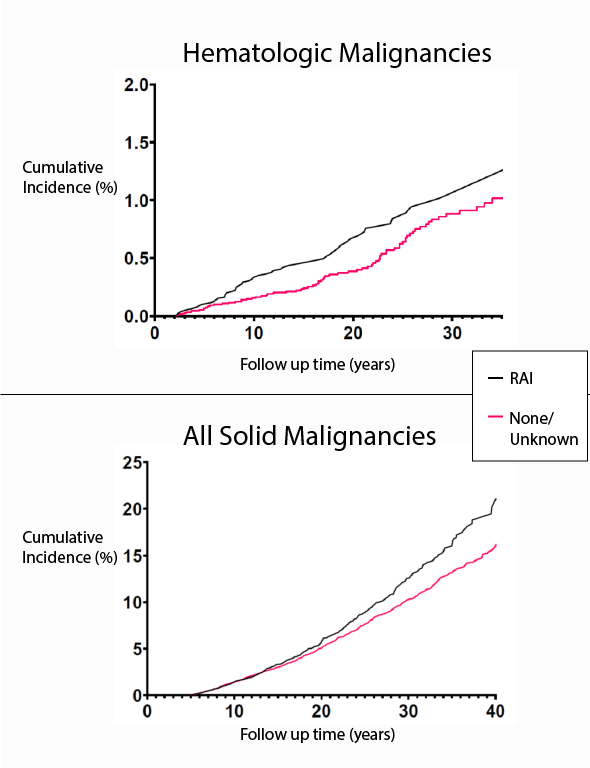Radioactive Iodine Treatment for Thyroid Cancer Associated with Increased Risk of Second Cancers
, by Maura Kate Costello, M.A.
The use of post-operative radioactive iodine (RAI) in the treatment of thyroid cancer has been linked to an increased risk of leukemia within 2-3 years after exposure, but the risks of solid cancers have been unclear, especially in the long-term. In one of the largest studies of its kind with more than 40 years of follow-up, DCEG investigators found that RAI therapy for differentiated thyroid cancer (DTC) among people younger than 45 years old was associated with 23% increased risk of solid cancer and 92% increased risk of leukemia relative to those who did not receive RAI therapy. These findings were published in May 2022 in the Journal of Clinical Oncology.
To quantify second cancer risks associated with RAI treatment, Elisa Pasqual, M.D., Ph.D., postdoctoral fellow in the Radiation Epidemiology Branch, and colleagues analyzed U.S. population cancer registry data from over 36,000 children and young adults diagnosed between 1975 and 2017. While increased risk of leukemia after RAI treatment has been previously reported, the added value of this study is its longer follow-up time which made it possible to observe increased risk of solid cancer. The elevated risk of solid cancer associated with RAI treatment was greater starting 20 years or more after diagnosis compared to less time since diagnosis, and higher among those who were diagnosed before age 25 compared to those who were diagnosed at older ages. These findings add more detail to the existing evidence: following exposure, risk of leukemia is elevated in the short term, while risk of solid cancer rises in the long term, and those exposed at younger ages experience higher risk than those exposed as adults.
Taking a closer look at the solid cancer risks, the researchers found that treatment with RAI (versus no treatment with RAI) was associated with increased risk of salivary gland cancer (by 200%), uterine cancer (by 55%), lung cancer (by 42%), and female breast cancer (by 18%). Notably, breast cancer was the most common cancer in this cohort. The elevated risk of breast cancer associated with RAI treatment was stronger after more than 20 years since diagnosis (a 46% increase) and for those diagnosed before age 25 (a 64% increase) ages. Considering that thyroid cancer is 3 times more common in women, these findings regarding breast cancer warrant special attention from a public health perspective.
The results of this study highlight the need for greater caution and consideration of the risks versus benefits of RAI therapy in the management of DTC, especially with younger patients who are more vulnerable to the carcinogenic effects of radiation exposure and are more likely to experience long-term effects than older adults.
Reference
Pasqual E, et al. Association Between Radioactive Iodine Treatment for Pediatric and Young Adulthood Differentiated Thyroid Cancer and Risk of Second Primary Malignancies. J Clin Oncol. 2022.
